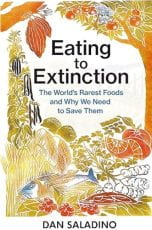Eating to Extinction by Dan Saladino

This was my second attempt at reading this book. It just looked so loooong that I couldn’t face it although I thought I might be interested in the actual content. So, I started in the middle with Stichleton cheese and worked my way out, reading at random whatever caught my fancy and ended up reading most of the book.
Who wouldn’t be interested in the fact that we have many foods that are disappearing? The same arguments about animals becoming extinct apply to foods. Loss of diversity leads to greater dangers in a food being wiped out; lower diversity for wildlife and lower diversity for our gut microbiome. Often the people that continue with these foods are passionate about them or are part of a long tradition of making/growing them and when they die, so do the ways they know. This makes Saladino’s book really important in that it highlights what these foods are.
Stichleton cheese has suffered because it is made with raw milk. Can you imagine the French refusing a cheese made with raw milk? Stilton can only be made with pasteurised milk to be called Stilton. Pasteurisation did save many, many people from tuberculosis amongst other things but in eradicating raw milk we also lost something else.
Perry was also interesting – a cider type drink made with pears. I used to live in Worcestershire, one of the counties that made Perry, and in my time there orchards disappeared at an alarming rate. Now Perry trees are few and far between and their location has to be kept a secret. It is a delicious drink, quite deceptive and why wouldn’t the future of pears one day be dependent on some of the genes included in perry pears?
There used to be over 4000 varieties of potato, almost as many of corn, hundreds of varieties of apple and cheeses made where the sheep were grazing. Now we have one main type of potato – 2 or 3 if we are lucky – and half of the world’s cheese made with bacteria and enzymes from one company. It seems we have forgotten what happened with the Irish famine where everyone grew the same potato so that when blight hit, it got every single plant. This food monoculture is a danger to the planet and to our health.
Saladino has taken on the role of alerting us to the plight of these foods but it is someone else’s work to share with us how we can change this, what we can each do without it costing us the earth.